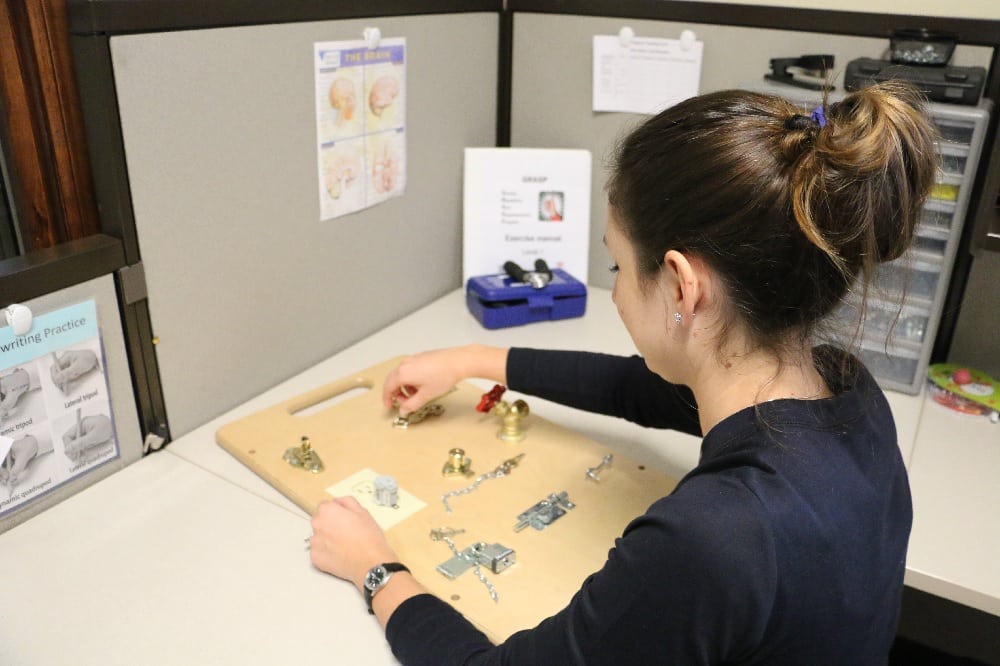
Skills like dressing, driving and grocery shopping often need to be relearned and retrained following a brain injury.
Occupational therapy focuses on person-centered and evidence-based treatment that helps people with brain injuries recover their ability to do all the things they want and need to do in daily life, also known as Activities of Daily Living.
From brushing teeth to paying the bills, occupational therapists want people to engage fully in the demands of everyday life with the least amount of assistance and supervision possible.
Pate occupational therapists focus on the recovering individual’s ability to participate in meaningful activities through rehabilitation and treatment, analyzing the activity, and modifying approaches using tools or strategies as needed. The end goal is to help people gain confidence in returning to their preferred activities.
Treatment sessions are focused on gaining more independence with real-world, functional activities at home and in the community. These sessions may include:
| Category | Description |
| Basic Self-Care | Bathing, toileting, dressing, grooming, eating |
| Home & Community | Shopping, meal preparation, home management (cleaning, gardening), managing finances, managing healthcare (medications, appointments), social participation, home safety, alternative transportation |
| Vocation & Productive Activity | Child and pet care, driving, volunteer pursuits, returning to previous job, finding new employment, school & education, leisure exploration |
| Sleep & Mental Health | Sleep hygiene, sleep positioning/mobility, healthy coping, mindfulness, breathing techniques, spiritual activities |
Pate's dedicated occupational therapists go beyond training individuals in just the basics. They actively listen to their patient's preferred goals and modify treatment accordingly.
Occupational therapists sometimes use activities people enjoy as therapy in itself; for example, hobbies can be incorporated into therapy to target what matters most to the person. It might be playing a musical instrument again, scrapbooking, or volunteering for a specific cause. Many times, if a person cannot do an activity the same way they once did, the occupational therapist and patient can collaborate to figure out a different way to complete the same activity. For example, recently one of Pate's occupational therapists successfully constructed a device for a patient who wanted to get back to crocheting but could only use one hand.
You can also find occupational therapists with patients in the community, such as at the grocery store, craft shops, or on the road addressing pre-driving skills to gain confidence in local areas. This is the type of empathy and creativity these therapists are known for. This creativity is important because every person is unique, and they deserve the extra effort to customize their recovery.
You would be amazed at all the elements that go into performing even the simplest of tasks. Unfortunately, we often take our independence in routine activities for granted.
Here are some of the skills we address to improve independence in daily roles and responsibilities at home and in the community:
Motor skills
- Arm/hand strength, coordination, and sensation
- Functional balance and walking for getting around your home or community
- Use of or compensation for affected arm/hands in functional tasks
Vision
- Eye movement skills
- Scanning
- Eye-hand coordination skills
- Compensating for any vision challenges such as double vision or visual field cuts
- Functional training for tasks such as reading, writing, and driving
Cognition
- Attention, memory, and executive functioning (planning, organization, problem-solving)
- Visual perceptual skills
- Training new strategies to be more efficient with cognitive skills
- Functional work-based or pre-driving activities, cooking, healthcare management, crafts, etc.
Sleep and Mental Health
- Coping strategy development and identification for mental and emotional health
- Sleep hygiene including bed positioning and routines
- Education and advocacy training for long-term self-management skills
Occupational therapists address anything and everything necessary to get you back to what you do during a typical day! They help people function in all their environments and consider the person’s home, work, school, and community to address the physical, psychological, and cognitive aspects of their well-being through engagement in occupation.
Other home and community-based services occupational therapists provide:
- Assess, order, and train with assistive devices and equipment as needed
- Recommend and address task adaptations
- Implement Constraint Induced Motor Therapy (CIMT) protocol for intensive motor recovery
- Use technology in the clinic and at home to supplement performance
- Re-establish daily roles, routines, and structured schedules
- Family education to bridge the gap between the clinic and home
- Provide cuing tools & memory strategies
- Provide driver evaluation and training, including training with assistive devices
- Perform home, school, and workplace evaluations
- Collaborate on accommodations and recommendations for returning to work
- Advise in career modification if necessary



